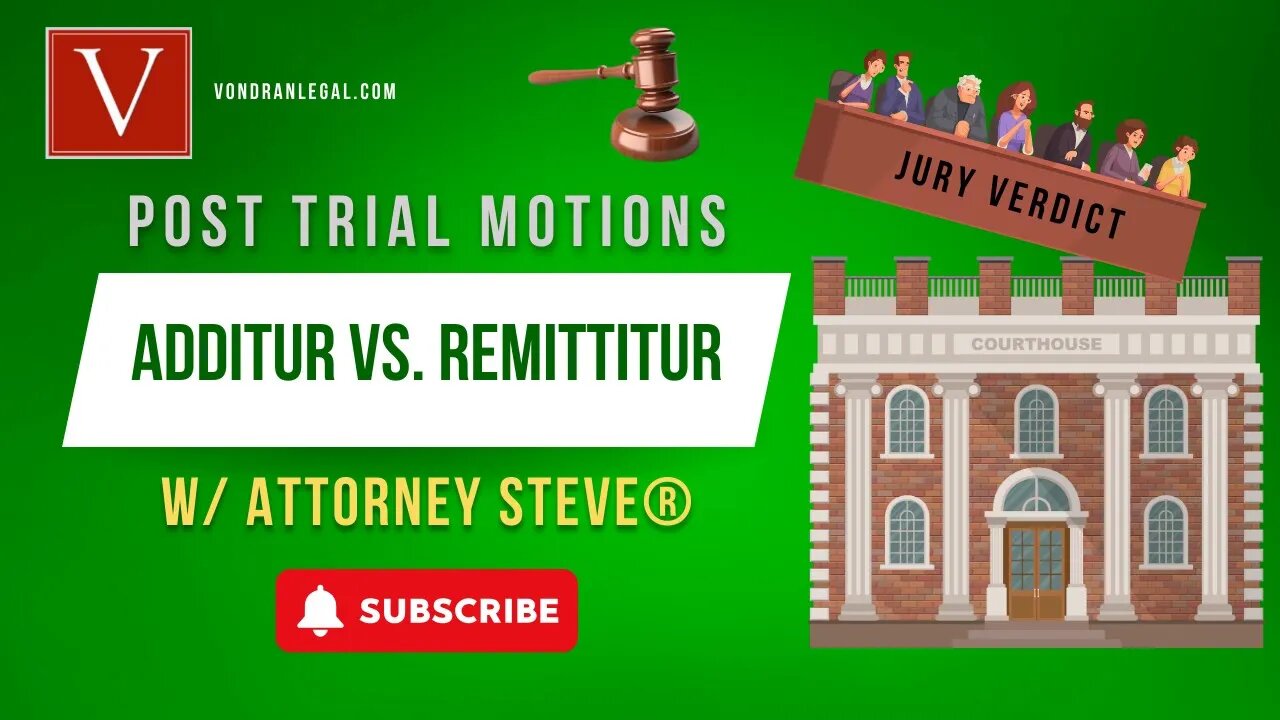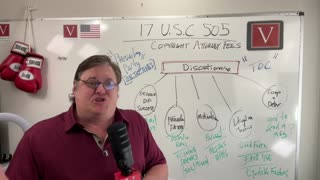Premium Only Content

Additur vs. Remittitur explained by Attorney Steve
http://www.vondranlegal.com - Vondeezy, Law Made EZ! Feel free to share this video! Thanks for watching and don't forget to SUSBCRIBE, LIKE and MAKE A COMMENT!!
WHAT IS THE DIFFERENCE BETWEEN A MOTION FOR ADDITUR VS. REMITTITUR
A motion for additur and a motion for remittitur are legal procedures related to jury awards in civil cases. They are typically used when one party believes that the jury's award is either too low (for a motion for additur) or too high (for a motion for remittitur) and seeks to have the court adjust the amount of damages awarded. Here's the difference between the two:
Motion for Additur:
Additur is a legal remedy used when a party believes that the jury's award is insufficient, and they want the court to increase the amount of damages. In this scenario, the party who is dissatisfied with the jury's verdict requests the court to add an additional amount to the jury's award. The judge has the authority to grant or deny the motion for additur. If granted, the judge will increase the amount of damages awarded by the jury.
Motion for Remittitur:
Remittitur is the opposite of additur and is used when a party believes that the jury's award is excessive or that the jury made an improper verdict. In this case, the dissatisfied party seeks to have the court reduce the amount of damages awarded by the jury. Similar to additur, it's up to the judge to decide whether to grant or deny the motion for remittitur. If granted, the judge will reduce the amount of damages awarded by the jury.
These motions are typically used when there is a clear and significant disparity between the jury's award and the evidence presented during the trial. The party making the motion must present a persuasive argument to convince the judge that an adjustment is necessary.
It's important to note that the availability and procedures for additur and remittitur can vary by jurisdiction, and not all legal systems allow for these motions. Additionally, the judge's decision to grant or deny such a motion is generally discretionary and based on the specific facts and circumstances of the case.
If the case is in federal court (ex. a copyright, trademark, or trade secret case), look to FRCP Rule 59 which permits a motion to amend or alter a judgment.
-
 4:50
4:50
Attorney Steve® Legal News
5 months agoWhen can you get attorney fees in copyright infringement cases?
19 -
 LIVE
LIVE
Michael Franzese
51 minutes agoFormer Capo REVEALS: What My Life Was Really Like in the Mob
897 watching -

The Quartering
2 hours agoDangerous ICE Tracker App, Luigi Mangione Bombshell, H1-B's Blown Out, EBT Meltdowns!
93.4K14 -
 LIVE
LIVE
Mally_Mouse
1 hour ago📣Telescreen Talks - LIVE!
180 watching -
 1:57:29
1:57:29
DeVory Darkins
16 hours ago $34.27 earnedDemocrats drop SHOCKING Update regarding ICE Agents - Myron Gaines
117K54 -
 21:24
21:24
Professor Nez
1 hour ago🚨WOW! Trump got EMOTIONAL when RFK Jr. Said THIS!
11.5K13 -
 LIVE
LIVE
Jeff Ahern
1 hour agoNever woke Wednesday with Jeff Ahern
134 watching -
 1:06:21
1:06:21
Timcast
4 hours agoLiberals DEFEND Nazi Tattoo On Communist Democrat Senate Candidate, ITS A CULT
136K145 -
 LIVE
LIVE
Side Scrollers Podcast
2 days ago🔴FIRST EVER RUMBLE SUB-A-THON🔴DAY 3🔴100% REVENUE HELPS CHANGE CULTURE!
1,333 watching -
 25:57
25:57
The Kevin Trudeau Show Limitless
5 hours agoThe Sound Of Control: This Is How They Program You
13.6K6